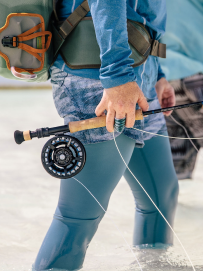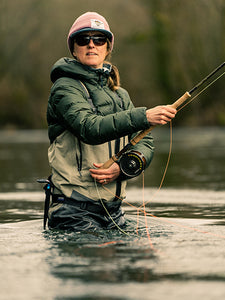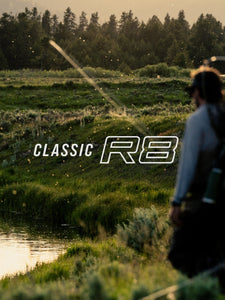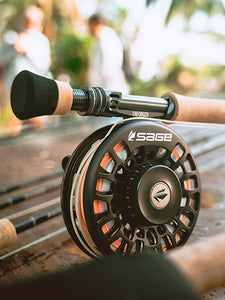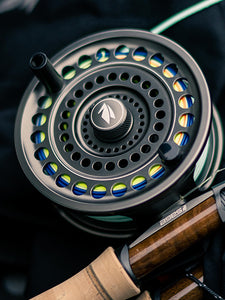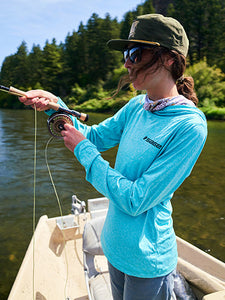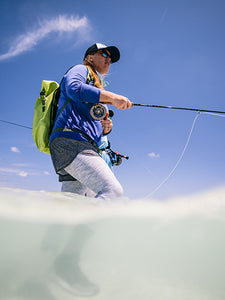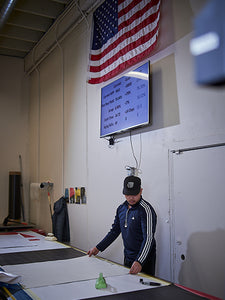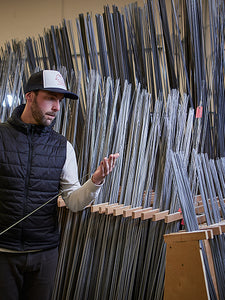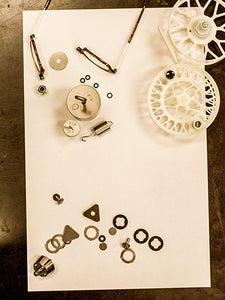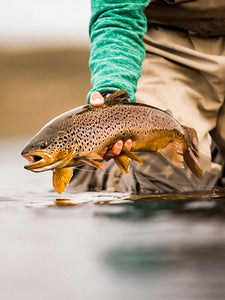
Road Worthy
Any angler in the eastern U.S. knows what’s about to happen when the Redbud trees start to bloom. Like miniature stoplights, the buds signal a stop to the winter doldrums. The major hatches of the spring are ushered in by one of the first examples of spring foliage. Redbuds mean the prolific Grannom Caddisflies are close to their annual emergence. This is the first big hatch that kicks off a three month long chain of both concurrent and overlapping spring hatches. Local anglers socked in all winter wait and tie flies in anticipation for this magical time. To the migratory guide the Redbud bloom means that it’s time to pack up camp and head north.

I first began my foray into Eastern Tennessee after several tough winters in Erie, Pennsylvania froze me out. The last winter there was a particularly cold one that pushed late into the spring. Cold weather camping always had required preparation. I’d put together a heated water line into my trailer, and had made sure that everything else was well insulated. One day late in the winter I turned a faucet on and nothing happened. The water main had frozen four feet under the ground. I spent the next two months showering at the gym and hauling water from Elk Creek to flush toilets with. It was the closest that I’ve ever come to living off the grid, and was too close to interest me in a repeat performance for the next winter. It was time to find a new off season venue.
During the next fall season, I learned about the amazing tailwater fisheries of the Southeast. Late in the season, I went on an investigative trip to the South Holston River Lodge with two friends. We found spring-like weather and daily dry fly fishing. Both of the tailwaters were floatable on a daily basis, and had consistent conditions. There was no doubt in my mind. Bristol, Tennessee was to be my winter escape plan.
Since then my time in Bristol has grown longer and longer each year. I look forward to it in the fall, and am rarely ready to leave when the spring arrives. The fishing gets better and better as the end of my time approaches, as does the weather. My ties to the region get progressively stronger. I settle in quicker every year though it doesn’t make leaving feel any less premature. Everything in nature speaks of what is about to happen as the time to leave approaches. Only the early bloom of Eastern Redbuds reminds me to return north before the same begins there.

The wintertime consistency of Tennessee’s tailwaters lends itself to conditions in the west. Midge and olive hatches seem to occur all year long, and fish feed hard through the winter. This is in contrast to the northeast, where rivers freeze and fishing ceases for the most part. Eastern hatches come and go by the time that the heat of the summer arrives. The Tennessee tailwaters are spared this cycle by the prolific Sulphur, which hatches as long as 9 months a year. The condensed nature of excellent fishing in the northeast is what that makes the signal of the Redbud so special. It is like the river awakens. Fish that haven’t fed much through the winter go ballistic feeding on the surface. To the angler, the sudden sight of every fish in the river rising is an almost forgotten spectacle. For me it is something that I can’t miss.
Packing up and changing venues is no small feat despite my efforts to design my life around this process. There is always anticipation and anxiety. The mountain of guide licensing red tape to work on the Upper Delaware has to be scaled. Last minute guide trips hamper attempts to prepare in advance. Relationships have rarely taken their course before they become geographically challenged. Vehicles and trailers need attention. Bearings need repacking and oil needs changing. Anything that promotes disaster avoidance on the trip must be addressed in advance. And then, there are always the things that you can’t prevent.
One of the worst of these developments comes in the form of a camper slide out that gets stuck and won’t retract. It often takes hours to free one up which in turn wreaks havoc on departure timing. Leaving late means driving and setting up camp in the dark. A stuck slide creates a sort of camp purgatory. You can’t leave because the damn thing won’t go into its retracted position. You also can’t very well stay put either. Pulling in slides is the absolute last step in breaking camp, and you risk another one getting stuck if you backtrack.

On one occasion I had a bracket for a hydraulic ram blow apart on a stubborn slide. When it broke it sounded like a shotgun going off. The subsequent chain of expletives that I rattled off was even louder. Neither was to go unnoticed in the Methodist campground where it occurred. A small crowd of the camp’s elders assembled as I assessed the damage. In a hasty fit I pulled a welder, two grinders, a torch, and a bunch of steel out of my storage. To their amazement I proceeded to fabricate a new and improved bracket on a nearby picnic table turned metal shop. I installed it, put all my shit away and got the slide retracted. My proud moment was quickly silenced by simple sensibility. One of the camp’s elders remarked that perhaps if I didn’t have all of that heavy equipment in my camper then maybe the slide outs wouldn’t get stuck. I tend to operate more along the lines of bringing a raincoat on a sunny day’s float to keep it from raining. This philosophy has saved me many times, but it is by no means lightweight.
The run up north entails the practice of pulling a 22,000 pound fifth wheel with a drift boat trailer hanging off of a stinger hitch behind it. While legally tolerated during my travels out west, no eastern seaboard state permits it. The run north to central Pennsylvania and later on to the banks of the Upper Delaware always includes the threat of tangles with the law. Certain reroutes are necessary to avoid major highways. Any travel through Virginia is asking for trouble. A long and indirect route over secondary roads further complicates the trip. Other concerns include the inability to back up, make U-turns, or utilize anything short of a truck stop to get fuel. Couple all of that with a general fear of passing the law, and you have the makings of my twice yearly eastern migrations.
I am always envious of my dog’s oblivious state at this time. He is simply excited to be going somewhere, somehow. Any and all of the potential meltdown possibilities associated with dragging the circus train 800 miles never occur in his mind. Having already encountered many of the eventualities of this type of travel rewards me very little comfort. I say my goodbyes and pack it all up in hopes that my travels will be uneventful. And, in most cases, it all goes off without much more than a few hiccups.

Upon arrival in Pennsylvania I invariably find that I’ve gotten there a bit early. It is as though I have driven back into winter. My reward for another successful cannonball run from the south quickly equates to frozen camper hookups and bitter cold mornings. Dry fly fishing gets put on hold as the frost hangs on. Streamer and nymph rods pass the time as the water begins to warm. As the years pass I have gotten slightly better at understanding the longitudinal variation of Redbud timing, but it’s never perfect. Patience and tolerance for crappy circumstances are the hallmarks of the hatch chasing angler. Too early and you freeze your ass off, but too late and it might as well have never happened. Any attempt to guarantee that you hit that magical first day of a big hatch depends on arriving early. Reports from down south of how awesome the fishing and weather have been trickle in. Winter doldrums drag on. The lead up time is when you second guess your decision to have moved in the first place.
On top of all of this, there is the X factor that the mystical miracle hatch may not even happen. Big rains and swollen rivers are unpredictable and render big hatches unfishable. Low water years render drift boats useless. Bad hatch years yield underwhelming results. Blanket hatches make the fish hard to catch. In some years I can’t get there early enough or can’t stay and wait any longer due to my work schedule. Sometimes, it just never happens for reasons known only to nature.
When it all does come together, and the stars are aligned the miracle happens. The first days of the first spring hatches are simply unreal. All of the madness of getting there evaporates. You realize the genius of your move. There you are with your whole life in place. Your socks are in the same drawer. The TV remote is lost in the exact same place as it was in Tennessee. You tie flies at the same desk as you always do, and look out the same window. Only the view has changed. You’re there with your rolling household, your boat and all your shit, and it’s just how you left it. You and your oblivious dog have arrived, exactly where you needed to be at that moment. That is what keeps me mobile and keeps me road worthy.

About the Author
Matt Ippoliti is a fly fishing guide and Sage Elite Pro that truly embraces a nomadic lifestyle, splitting his time between Tennessee, Pennsylvania, New York, and Colorado. His enthusiasm and experience from each fishery is truly showcased wherever you may find yourself on his boat.


